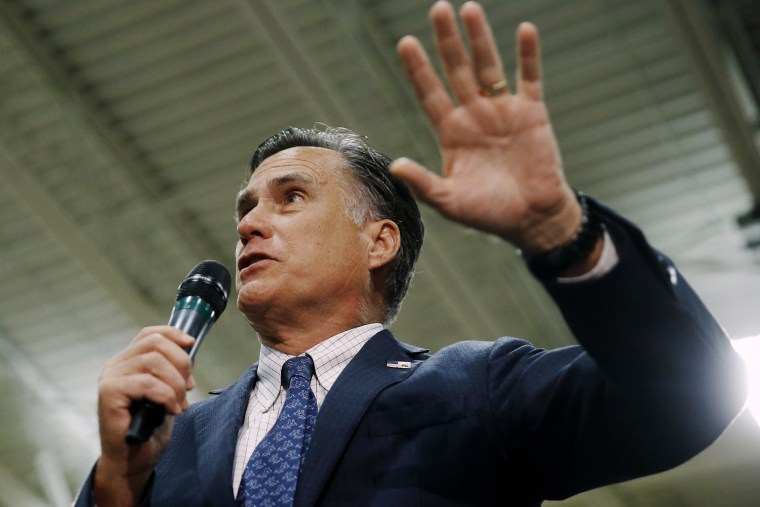The Weekly Standard's Bill Kristol, a prominent figure in Republican politics for many years, apparently isn't kidding about helping organize a third-party campaign to run against his own party's presumptive presidential nominee. As regular readers know, Kristol has spent months talking up such an effort, "probably for 2016 only," and the initiative has moved beyond just random chatter.
"I think the ballot access question is manageable," Kristol said in March. "The big question is, who's the candidate?"
To that end, organizers reached out to former Texas Gov. Rick Perry (R), who declined and endorsed Donald Trump. Then there was retired Gen. James Mattis, who seemed receptive, but who withdrew from consideration last week. Sen. Ben Sasse (R-Neb.) and former Sen. Tom Coburn (R-Okla.) bowed out, too.
A few days ago, attention reportedly shifted to Mitt Romney, according to this Washington Post report.
In spite of his insistence that he will not run, Mitt Romney is being courted this week by a leading conservative commentator to reconsider and jump into the volatile 2016 presidential race as an independent candidate. William Kristol, the longtime editor of the Weekly Standard magazine and a leading voice on the right, met privately with the 2012 nominee on Thursday afternoon to discuss the possibility of launching an independent bid, potentially with Romney as its standard-bearer.
Kristol told the Post that the two had an informal chat in a D.C. hotel, asking not only about Romney's potential interest in another candidacy, but also about whether he'd be willing to support such a campaign in the event he chooses not to run.
By all accounts, Romney is sticking to his decision not to be a 2016 candidate, but the fact that this meeting happened at all suggests the Republican plan to run a campaign against the Republican nominee isn't dead just yet. Kristol and his allies can't seem to find a candidate, and Election Day is just six months away, but organizers are undeterred.
And what happens if they succeed in launching a meaningful operation with a candidate whose name actually appears on the ballot?
Jon Chait noted the other day that quite a few pundits have made the case that a credible third-party operation, launched by anti-Trump Republicans, would likely throw the entire presidential election to the U.S. House because no candidate would be able to reach 270 electoral votes.
I'd recommend skepticism with this entire line of thought. Remember, popular-vote totals don't decide the presidential election, electoral votes do. The anti-Trump Republican ticket -- if it exists -- might be able to generate upwards of 15% or 20% of the raw vote totals, but that's irrelevant when it comes to pushing the election to Capitol Hill.
The better question is whether or not the third-party campaign could win the most votes in a significant number of states and thereby obtain their electoral votes. That is, after all, how the American constitutional system works.
And in this case, there's no reason to believe the right splitting its vote between the Republican nominee and the anti-Trump Republican nominee would accomplish anything except help the Democratic nominee win more states.
Remember, Kristol and his cohorts are talking about finding a conservative rival for Trump. Are there legions of Democrats and progressive voters clamoring to support a Romney-like candidate instead of Hillary Clinton? Probably not. There may be GOP voters for whom such a ticket might have appeal, but again, that only makes it easier for Clinton, as the likely Democratic nominee, to win these states.
